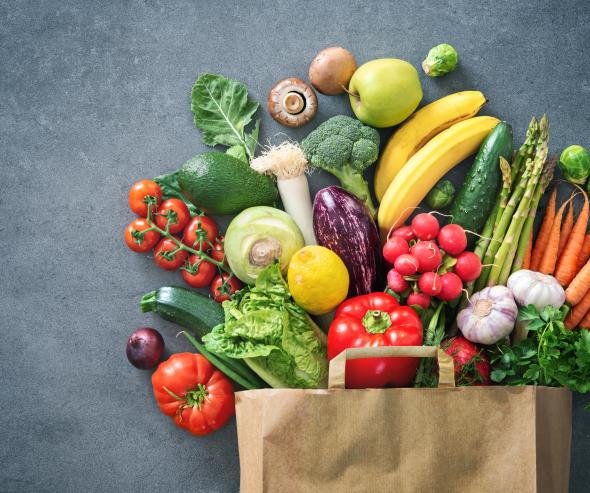Conditionnal green light to the acquisition of 100 Bio c' Bon stores by Carrefour

For the first time, the Autorité has recognized the existence of a market for organic products
The Autorité clears the takeover of 100 Bio c'Bon stores by Carrefour, subject to the divestiture of eight stores
On 21 September 2020, the Carrefour Group notified the Autorité de la concurrence of a plan to acquire 100 shops operated under the tradename Bio c' Bon. The transaction follows the opening of judicial liquidation proceedings before the Commercial Court of Paris on behalf of the Bio c' Bon Group. On 13 October 2020, the Autorité exceptionally granted a derogation (see box), allowing the Carrefour Group to proceed with the acquisition, without waiting for the final approval decision, which has just been issued by the Autorité.
Parties to the transaction
Carrefour and Bio c' Bon are two distribution groups of mainly food products active throughout France.
The Carrefour Group primarily distributes conventional (meaning that they are not organic) food products, but also organic products, notably through its hypermarkets, supermarkets and convenience stores. It also operates a network of stores specialising in the retail distribution of organic products under the tradenames So'Bio and Carrefour Bio.
The Bio c' Bon group specialises in the retail distribution of organic products through a network of 120 stores under the tradename Bio c' Bon located throughout France.
Supply and distribution of organic products
The companies affected by the merger are simultaneously active in the distribution of primarily food products and, more specifically, in the distribution of primarily organic food products.
For the first time, the Autorité has recognized the existence of markets for organic food products, by identifying a market for the supply and one for the distribution of primarily organic food products. After a thorough investigation, fuelled by a consumer survey in particular, it then decided on the competitive structure of these markets.
With regard to the upstream supply markets, the Autorité identified a specific market for the supply of organic products. It relied on the existence of dedicated supply channels, specific production methods, and the existence of certifications and binding specifications for organic products.
As regards the downstream distribution markets, the results of the consumer survey carried out as part of the investigation of the transaction, together with the various clues gathered in the course of the examination (the price and quality differences between organic and non-organic food products among others), revealed the existence of a specific market for the retail distribution of predominantly organic food products.
These organic products are mainly distributed by two main distribution channels: general stores (hypermarkets, supermarkets, convenience stores self-service stores and maxi-discount stores, more commonly referred to as "major food retailers" or "GSA") and stores specialising in the distribution of organic products ("GSS"). The latter are very important today in the sales of organic food products, as they account for 83% of organic product sales in France.
The information gathered by the Autorité in the course of its investigation has made it possible to show that distribution through the GSS channel presents specific features compared with the GSA distribution channel, in particular in terms of prices, product ranges and characteristics, and the depth of the range. Consumers of organic products in GSS stores, questioned via a survey, indicated that they would not shift their organic purchases to GSA in the event of a price increase in specialised stores.
The Autorité therefore concluded that there was a separate market for the retail distribution of predominantly organic food products restricted to GSS, a market in which the parties' activities overlap given the presence of Carrefour through its Carrefour Bio and So'Bio brands.
The Autorité was able to rule out any competition concerns linked to the transaction in the supply market for organic products
Given the modest market shares of the parties in the supply market, the Autorité considered that the transaction was unlikely to significantly increase the new entity's purchasing power with respect to organic product suppliers. Further, after consulting with the parties' suppliers (as part of a market test), the Autorité found that the transaction does not place these suppliers in a situation of economic dependency on the new entity.
Risks to competition in the distribution of organic food products identified in 10 catchment areas
At the end of its analysis, however, the Autorité considered that the transaction raised risks of harm to competition in four catchment areas surrounding the acquired stores in Paris (located on rue de Cléry, rue de Bourgogne, rue Lecourbe and rue du Poteau) and in six areas outside Paris (Levallois-Perret, Nancy, Puteaux, Toulouse rue des Frères Lion, Toulouse rue Paul Vidal and Toulouse rue Rémusat).
In these areas, the transaction was likely to reduce competitive pressure given the position of the new entity at the end of the transaction, and could lead to price rises or a reduction in the diversity of the offering, to the detriment of consumers.
Carrefour has undertaken to divest of 8 stores to resolve the identified competition-related concerns
To address these competition-related concerns, Carrefour has undertaken to divest of eight Bio c' Bon or Carrefour stores in these areas, to one or more competitors. These commitments will reduce the market shares of the new entity to a reasonable level and allow competing brands to strengthen their presence or establish themselves in the areas concerned and thus compete more effectively with the new entity.
The acquiring party presented will need to be approved by the Autorité, which will ensure that they are able to provide a credible alternative in organic products in GSS in each of the eight areas in question. An independent trustee approved by the Autorité will ensure the implementation of these commitments.
The stores affected by the divestiture are the following:
| Area(s) concerned | Store | Adress |
|---|---|---|
| Levallois-Perret | Bio c’ Bon ou Carrefour Bio | Bio c’ Bon : 64, rue Rivay et 52, rue Paul Vaillant Couturier Ou Carrefour Bio : 30, rue Gabriel Péri |
| Nancy | Bio c’ Bon ou Carrefour Bio | Bio c’ Bon : 37-41 rue Saint Georges Ou Carrefour Bio : 47 rue du faubourg des trois maisons |
| Paris Cléry | Bio c’ Bon | Bio c’ Bon : 15 rue de Cléry |
| Paris Lecourbe et Paris Bourgogne | Bio c’ Bon | Bio c’ Bon : 18-24 rue Lecourbe |
| Paris Poteau | Bio c’ Bon | Bio c’ Bon : 60 rue du Poteau Ou Bio c’ Bon : 229 rue Championnet |
| Puteaux | Bio c’ Bon | Bio c’ Bon : 104-112 rue de la République |
| Toulouse Lion et Toulouse Rémusat | Bio c’ Bon | Bio c’ Bon : 23 rue des Frères Lion |
| Toulouse Paul Vidal et Toulouse Rémusat | Bio c’ Bon | Bio c’ Bon : 7-13 et 35 rue Saint-Jérôme / 13-23 rue Paul Vidal |
What is a derogation from the suspensive effect?
If the effective conclusion of a merger is subject to approval from the Autorité de la concurrence, in certain exceptional circumstances, duly argued by the parties, the Autorité may issue a derogation enabling them to finalise part or all of the transaction without waiting for the approval decision, in order to allow the business activities to continue.
By definition, the granting of such a derogation is exceptional. In particular, a derogation may be granted where takeover bids have been submitted for companies in liquidation or in insolvency proceedings, as in the present case.
However, the granting of a derogation by the Autorité is without prejudice to the final decision taken at the end of the investigation.
Divestiture of stores during a transaction: goals and methods
The divestitures of the stores that are the subject of the commitments is intended to safeguard adequate local competitive dynamism.
The aim is to allow a competitor to take over the stores and its activities in order to safeguard competition in the area in question, thereby ensuring that consumers have a diversified offering in terms of prices and products. The divestiture process is closely monitored by the Autorité in the months following the authorisation decision. The party to the transaction must present to the Autorité buyers able to provide effective competition. It is after the examination of these buyers that an approval can be issued by the Autorité, which will authorise the effective sale of the store in question
These divestitures do not entail the closing of stores but a takeover with a brand change.
The full text of the decision will be soon be published on the Autorité de la concurrence website.
Contact(s)
